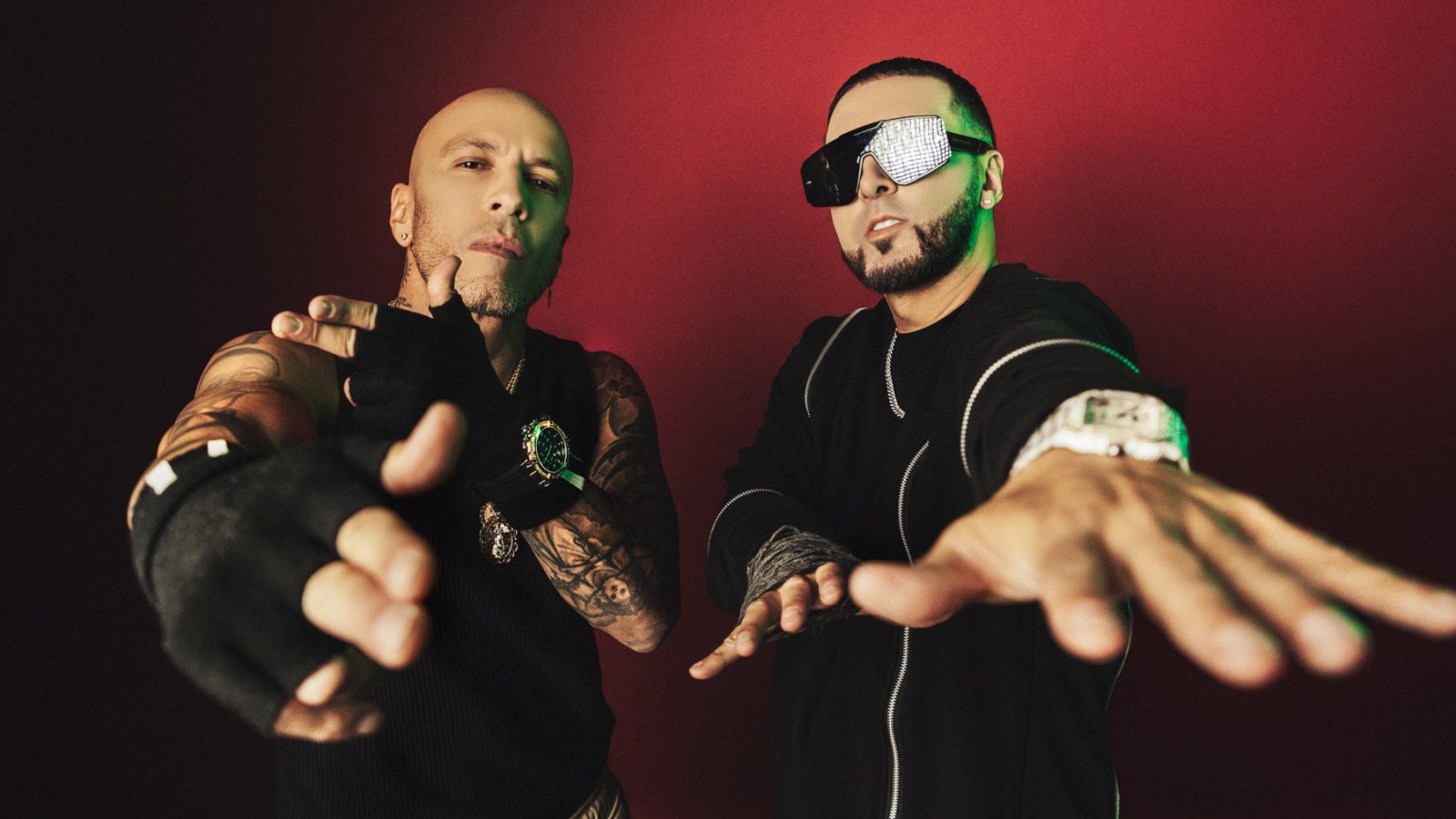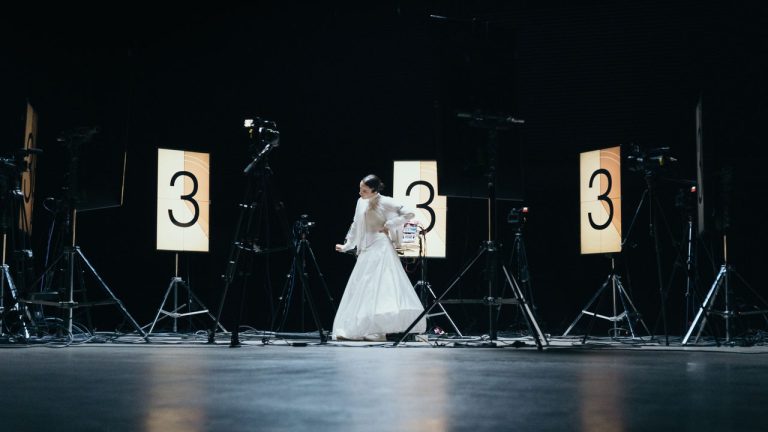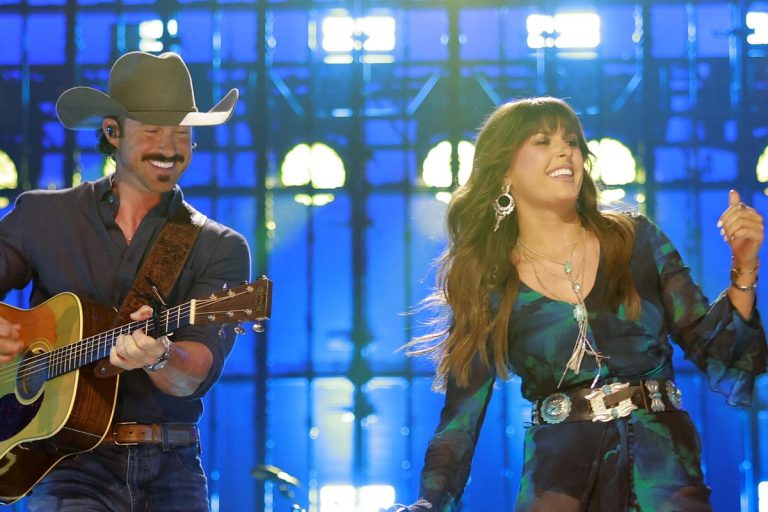Alexis & Fido have been here since the beginning. But though they’re legitimate OGs of reggaeton, the dynamic performers and masters of the double-entendre are some of the quietest superstars in a genre that’s not quiet at all — though foundational hits like “5 Letras,” “Mala Conducta,” and “El Tiburón” speak for themselves.
They’re celebrating their 20th anniversary this year, marking when they serendipitously teamed up as a duo on the album Desafío thanks to the data limits of CDs (more on that below.) Both hail from Cayey, the same hilly town as international headliners Wisin & Yandel, who share a history with Alexis & Fido.
As a teen, Alexis teamed up with his younger brother Small, their close friend Wisin, and the late DJ Cell Darkitek to form the quartet Boricua Selecta. Their sound was firmly entrenched in the gritty late-Nineties Latin ragga-rap vibe popular at the time, though they had few appearances. Even their old stage names read like monikers extracted from a time capsule: Alexis was Baby Ranking, Wisin was El Tical. Fido, meanwhile, became close friends with Yandel in elementary school. In junior high they too formed their own ragtag group, crafting songs and honing their talent on mixtapes and loose cassette albums.
“It was very hard to get into the scene, which was called ‘underground’ back then,” says Alexis. “The nucleus of it was The Noise, Playero, and you had to live in the metropolitan area in order to [have a shot.]”
The difficulty getting their foot in the door almost forced them to reconsider their path. Alexis got married at a young age and moved to Pennsylvania, while Fido went into the Army. Four years later, they found themselves back in Cayey, and back near their old friends, who were now suddenly making a name for themselves.
With a healthy push from Wisin & Yadel, Alexis and Fido began to appear on projects like Grayskull II, La Mision III, and Yandel’s first solo album Quien Contra Mi. Two decades later, they now have eight studio albums, a number of world tours, hundreds of millions of streams, and so much more under their belt. And they continue to attract a new generation of fans: They’re featured on Rauw Alejandro’s new album, Cosa Nuestra, on a sticky perreo called “Baja Pa’ Aca,” which Alexis describes as “a new model car with old-school rims.”
The two sat down with Rolling Stone to talk about their history, their hit-making process, career bumps, and how they feel about being “underrated.”
You each knew Wisin and Yandel individually, but how did Alexis and Fido actually meet?
Alexis: We met at the studio of DJ Jaime, [who is] still Wisin’s DJ still to this day. Back then, everyone [in Cayey] would go and record there. I was there one day and Fido arrived, and I recognized him because back then, Fido was one of the hardest songwriters in the area. I already admired him, because his songs were different from everyone else’s. The word was, “Watch out for this guy, he’s really fucking good.”
Fido: People started to know us as solo artists under the wing of Wisin and Yandel, and we got invited to participate in Desafío. There was only one slot left on the tracklist, and they couldn’t fit another song because there was a data limit. It had to be Alexis alone, or Fido alone, and Wisin suggested we do a track together.
Alexis: It was a sign. They had 23 songs and needed one more. We were gonna be the last song, the 24th. But the song was so good that they put us as the 7th track.
Back in those days, compilation albums were a big deal, and artists would appear on dozens of them a year, but you two mostly showed up on ones from Luny Tunes and other major labels. Was that a conscious decision, to avoid over-saturating your name or to protect the quality of your music?
Fido: When we started to blow up in the beginning, we’d been given a lot of advice from Wisin & Yandel — they’d mentored us — so we were more strategic and selective. We’d get calls to be on lots of albums, but we’d say no. We stuck to the big albums, and that helped audiences see us as “elite” artists in that time.
Alexis: It was also [risky] because if you’re on such a big album, in that spotlight, and you made a shitty song, everything else was gonna fall around you. We always knew we had to make an impact with our tracks.
Being together for so many years must come with difficult times. Was there a moment in your career when you two felt that you weren’t creatively locked in and wanted to step away?
Fido: It always happens. Making an album is really hard, especially because we write our own songs. Every hit people have heard, to this day, has been all us. During that time between Sobrenatural (2007) and Perreología (2011), I was mentally blocked and would constantly ask “What now?” I kneeled and asked God to give me the talent and energy so I could write better, and the very next day I started feeling this frequency in my head, like a muse. I started aligning my energy, changing my negative feelings to positive ones, my mind opened up, and that’s when I made Perreología.
Alexis: And that’s still considered our best album, and some call it one of the best in the genre, next to The Last Don, Barrio Fino, or Los Extraterrestres. Fourteen songs, and eleven had radio play, organically. I love La Escuela, too. I still think, man, what a shame that it came out during the pandemic and under a label that didn’t really believe in it. I love it, it’s one of my favorites.
For over a decade now, you two have consistently come up as one of the “most underrated” reggaeton acts of the genre. Some might consider that a backhanded compliment. Do you feel comfortable with the arc of your career, though? Is that “most underrated” label fine with you?
Fido: That’s because we never had elite management — management that would have taken our career and brought it up to the level of Wisin & Yandel or Daddy Yankee. The songs were there, the hunger and vision of Alexis & Fido was there, but personally I always say it was because of that. We did everything ourselves: our deals with labels, publishers, booking. We had management, but not [to that level.] Some management has standing that helps put artists ahead in the industry.
Alexis: We’ve been signed to four different labels, and we’ve never “clicked” with any of them. They’ve never 100 percent supported Alexis & Fido the way they’ve supported [other artists.] They’ve trusted them, invested in them, but never with us. Even for the awards shows, we’ve had to struggle to get nominations or perform [at those events.] It’s been really uphill. Labels want something that’s either fully commercial or fully perreo, and we’re right in the middle, and that was hard for them to understand. It’s all peaches and cream at first, but as the months pass you ask yourself, “What’s happening here? Where’re all these promises they made?” Time passes, they’re disappointed, we’re disappointed, and that’s when things get cold. And fans notice that. That’s why we’re independent now. We learned the hard way.
A few weeks ago, you were standing in the middle of El Choliseo, in front of a sold-out crowd of 15 thousand people, celebrating your 20th anniversary. Did the weight of that moment hit you?
Alexis: Oh, absolutely, and I think that exact moment was recorded, too. It’s not that we underestimate ourselves, but we did have doubts. The industry changes so much, the genre has evolved… We knew we were gonna give a great show, that was no question, but would people believe in us? We hesitated. And then at one point, after “5 Letras” and “Me Quiere Besar,” I looked over at Fido and told him “My brother, we fucking did it!” It was packed, and everybody was hyped, it was amazing. It’s on video somewhere.
As perreo veterans, how did you two experience the Latin trap boom in 2014 to 2015, considering how quickly it grew and attracted so many fans? Were you tempted to try something in that lane?
Fido: At first, yes. That moved very fast in Puerto Rico, and here you gotta be paying lots of attention to what the trends are. We’ve always had the vision of being accepted worldwide so our music was more commercial, but when this movement happened, we said, “We gotta do trap, too.” We did a trap with Bad Bunny, with Noriel, we did various [trap songs.] But when they came out, people didn’t really see us doing that. We were “the kings of perreo,” so we felt people weren’t accepting us. I remember I’d come up with ideas for songs and I’d be torn between, “Should I adapt this as a trap or a perreo?” And I’d be stuck between those two worlds. So, Alexis and I sat down and we agreed to stick with perreo.
Alexis: We’re not giving up perreo “ni pa’l carajo!”
With so many duos breaking up or going on hiatus, what’s your secret to not getting tired of each other?
Alexis: I don’t think we’re ever gonna break up. We’re gonna be like El Gran Combo, like those groups that just go on forever. It’s been 22 years working together, seven to eight albums, traveling the world, and when we started in this Fido had his dreams and I had mine too. But when we teamed up we [decided] to dream together, and the individual dreams got put to the side. I’d like to show people a side not many have heard. I love hip-hop and trap. I always dress the type, it’s my lifestyle. I have more than 50 [unreleased] hip-hop tracks in the studio. I’d love to work on that, maybe release them digitally. Not even go on tour with it or promote it, but still share it with the public. They’re songs about real life experiences, and they’re very personal and not connected to the duo at all.
Fido: That’s why I think there aren’t many duos these days. It’s very hard to maintain a career as one. You have to dream together. If one is always going to have different goals, the other will pull the other way, or they’ll worry about who is getting more attention [compared to] the other. They don’t understand those things the way Alexis & Fido do.




Leave a Comment